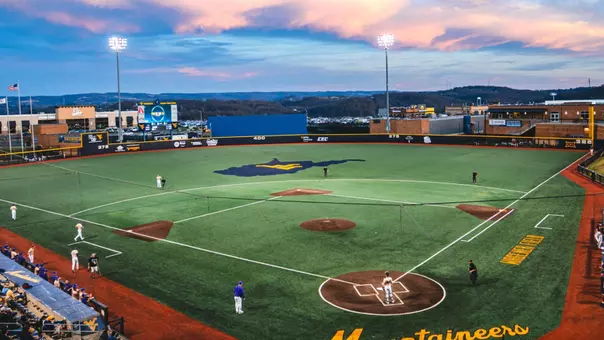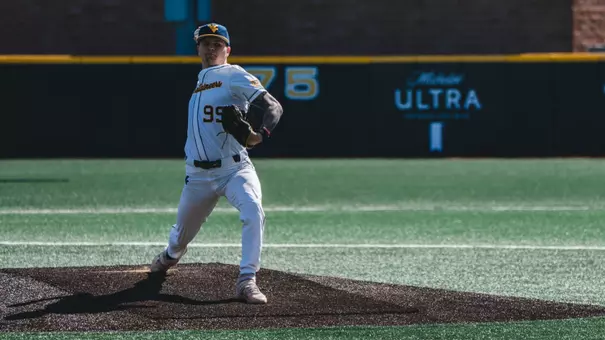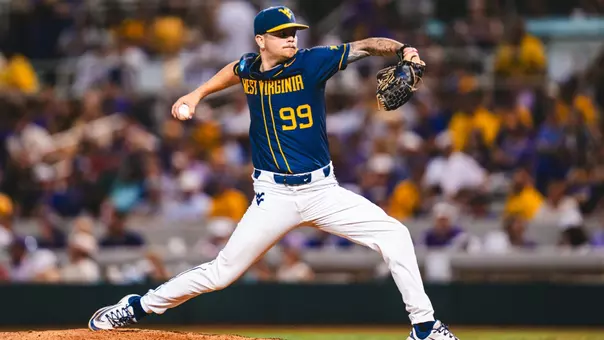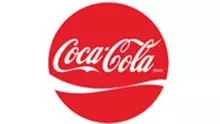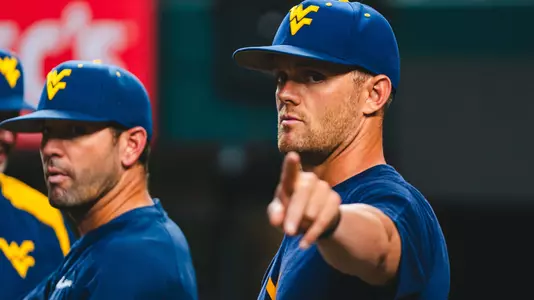
Photo by: WVU Athletic Communications
Sabins Working to Build on Program’s Momentum as he Preps for Debut Season
February 06, 2025 02:00 PM | Baseball
MORGANTOWN, W.Va. – Last year was the first time that a West Virginia University baseball team ever played in the NCAA Super Regionals, which means this year will be the first time a team will be following one that did.
And leading them will be its new coach, Steve Sabins.
Randy Mazey's 12-year tenure as West Virginia's baseball skipper concluded in 2024 about as well as anyone around here could have ever imagined.
After ending West Virginia's 21-season NCAA Tournament drought in 2017 and serving as host for a regional at Monongalia County Ballpark in 2019 for the first time since the 1950s, Mazey wrapped things up by taking Mountaineer teams to back-to-back regionals for the first time since the early 1960s.
History was made and now it is Sabins who is tasked with sustaining it, which can sometimes be more difficult than chasing it.
Sabins, visiting with media earlier this week via Zoom, said it's all about sustaining momentum.
"That's the name of our game," he explained. "It's about recruiting momentum. It's about season momentum. It's about getting the right coaches in place. It's about getting the right players in place. When I first got here, we were scrapping for momentum.
"I remember talking about the fact that we played in a Big 12 championship game, and that was what I was selling on the phone. 'Hey, we got to the Big 12 tournament championship game,'" he recalled. "We didn't win it, but we got there. We got a new stadium going, and we're going to build a weight room and some cages. We were talking about building this indoor facility years ago that we built, and we've got a meal room coming."
Next, it was the program landing its first-ever national recruit, Alek Manoah, now pitching for the Toronto Blue Jays, hosting a regional in 2019, winning a regional, qualifying for the Super Regionals for the first time ever last season and then having another top draft pick in shortstop J.J. Wetherholt.
Once one box is checked, you move on to the next one.
"You try and do some more stuff that's never been done in program history," Sabins explained. "I don't think there has ever been a top-25 recruiting class. We hadn't been to a regional in 21 years. We hadn't hosted a regional since the 1950s, and we hadn't been to two regionals in back-to-back years since the (1960s), so it's kind of one thing after another, and you are looking for that next thing that allows you to sell the program and to continue the momentum.
"The truth is, I wouldn't tell a 16-year-old recruit this, but on a scale with the national-level baseball programs, we haven't accomplished a lot," he admitted. "We haven't been to Omaha. We haven't hosted a Super Regional, and that's what I tell our staff. Last year was the best season in school history, which is incredible to be part of, but is that sustainable? Can we do that again? We don't know, but we're going to find out. We're always striving to do more. What's the next step? There is so much left to be done when you are looking at the big picture. I think that's what I focus on."
What Sabins is not focused on is being Randy Mazey 2.0.
Mazey was from a different era of baseball and was used to doing far more than head coaches typically do today. In some respects, he was a four-for-one coach because his knowledge and experiences were so vast. Sabins is smart enough to understand that he's not wired that way.
There are many ways to run a successful college baseball program, and Sabins is going to utilize and trust the people that he brought in to run their specific areas.
He explains.
"When (Mazey) got here, coaching staffs were smaller, and he really relied on his own experiences and skills a ton because coach Maze called the pitches. He ran the offense. He made bullpen decisions, and he really ran the game," he said. "This year, coach (Justin) Oney will call the pitches. Coach (Christopher) Reilly will help with decisions before the game as far as who is available and who is going to pitch. I will run the offense. Coach (Jimmy) Roesinger will position the infielders. Coach (Drew) Hefner is going to help the outfielders with some preparation stuff and coach (Jacob) Garcia will do the scouting reports.
"It's going to be a lot more diverse as far as the coaching aspect of it, relying on more people inside the organization, so that will be a little different just because there is more variation on the people who will have an impact in the game," Sabins noted.
Although Sabins is going to approach things a little bit differently, he won't forget some of the important lessons he learned from Mazey over the course of the last 10 years here together, specifically, Mazey's uncanny knack of correctly reading situations and making important decisions accordingly.
"I always joked with Maze because I'm a type-A personality, and Maze is pretty laid back and doesn't sweat the small stuff too much," Sabins laughed. "I'm a little bit more of an organizer and a planner and I'm pulling my hair out, and he would say, 'Never make a decision until you have to.' I think about that quite a bit because there are so many decisions sitting in this seat and you want to let those things unfold, whether that's naming a starter, picking staff members, locations, travel, buses, meals or whatever it is. You want to get as much information as you can to make quality decisions."
Now, a week away from its season-opening series at Jacksonville on Feb. 14, West Virginia is in a much different place than it was 12 years ago when Mazey took over a program that was expected to be a Big 12 bottom dweller.
That never happened, and today the Mountaineers are expected to be a Big 12 title contender. The preseason coaches' poll announced late last month had West Virginia fourth, below Oklahoma State, Arizona and TCU and ahead of perennial NCAA Tournament teams Texas Tech and Arizona State.
Perfect Game has West Virginia slotted No. 21 in its preseason poll, while the National Collegiate Baseball Writers Association picked the Mountaineers 29th.
West Virginia also earned 21 votes in USA Today's Preseason Coaches' Poll, which is mostly comprised of SEC and ACC teams.
The expectations today are like they once were here in the early 1960s when Steve Harrick was writing the chapters to the most successful period in school history.
"The expectations are awesome," Sabins said. "We talk about it to our team all the time. Expectations, outside noise and external opinions, all those things are a reality. The polls and rankings are flattering. It means the program is doing well.
"It's kind of like Arizona State winning the conference in football. Pretty much, nobody knows if we're good or not. We replaced half of our team from last year with transfer portal and incoming players, so it's just a massively different team," he added.
Sabins admits those things are nice, but what really matters is what happens out on the field.
"You have to be careful what you ingest," he said. "If you fall in love with yourself, you get your ass kicked. If you look ahead, you get your ass kicked. If you get too worked up about what other people think, you end up getting your ass kicked.
"We're just trying to stay the course, stay focused and get better – all those things that we talk about in our program all the time, those are the most important things," he concluded.
And leading them will be its new coach, Steve Sabins.
Randy Mazey's 12-year tenure as West Virginia's baseball skipper concluded in 2024 about as well as anyone around here could have ever imagined.
After ending West Virginia's 21-season NCAA Tournament drought in 2017 and serving as host for a regional at Monongalia County Ballpark in 2019 for the first time since the 1950s, Mazey wrapped things up by taking Mountaineer teams to back-to-back regionals for the first time since the early 1960s.
History was made and now it is Sabins who is tasked with sustaining it, which can sometimes be more difficult than chasing it.
Sabins, visiting with media earlier this week via Zoom, said it's all about sustaining momentum.
"That's the name of our game," he explained. "It's about recruiting momentum. It's about season momentum. It's about getting the right coaches in place. It's about getting the right players in place. When I first got here, we were scrapping for momentum.
"I remember talking about the fact that we played in a Big 12 championship game, and that was what I was selling on the phone. 'Hey, we got to the Big 12 tournament championship game,'" he recalled. "We didn't win it, but we got there. We got a new stadium going, and we're going to build a weight room and some cages. We were talking about building this indoor facility years ago that we built, and we've got a meal room coming."
Next, it was the program landing its first-ever national recruit, Alek Manoah, now pitching for the Toronto Blue Jays, hosting a regional in 2019, winning a regional, qualifying for the Super Regionals for the first time ever last season and then having another top draft pick in shortstop J.J. Wetherholt.
Once one box is checked, you move on to the next one.
"You try and do some more stuff that's never been done in program history," Sabins explained. "I don't think there has ever been a top-25 recruiting class. We hadn't been to a regional in 21 years. We hadn't hosted a regional since the 1950s, and we hadn't been to two regionals in back-to-back years since the (1960s), so it's kind of one thing after another, and you are looking for that next thing that allows you to sell the program and to continue the momentum.
"The truth is, I wouldn't tell a 16-year-old recruit this, but on a scale with the national-level baseball programs, we haven't accomplished a lot," he admitted. "We haven't been to Omaha. We haven't hosted a Super Regional, and that's what I tell our staff. Last year was the best season in school history, which is incredible to be part of, but is that sustainable? Can we do that again? We don't know, but we're going to find out. We're always striving to do more. What's the next step? There is so much left to be done when you are looking at the big picture. I think that's what I focus on."
What Sabins is not focused on is being Randy Mazey 2.0.
Mazey was from a different era of baseball and was used to doing far more than head coaches typically do today. In some respects, he was a four-for-one coach because his knowledge and experiences were so vast. Sabins is smart enough to understand that he's not wired that way.
There are many ways to run a successful college baseball program, and Sabins is going to utilize and trust the people that he brought in to run their specific areas.
He explains.
"When (Mazey) got here, coaching staffs were smaller, and he really relied on his own experiences and skills a ton because coach Maze called the pitches. He ran the offense. He made bullpen decisions, and he really ran the game," he said. "This year, coach (Justin) Oney will call the pitches. Coach (Christopher) Reilly will help with decisions before the game as far as who is available and who is going to pitch. I will run the offense. Coach (Jimmy) Roesinger will position the infielders. Coach (Drew) Hefner is going to help the outfielders with some preparation stuff and coach (Jacob) Garcia will do the scouting reports.
"It's going to be a lot more diverse as far as the coaching aspect of it, relying on more people inside the organization, so that will be a little different just because there is more variation on the people who will have an impact in the game," Sabins noted.
Although Sabins is going to approach things a little bit differently, he won't forget some of the important lessons he learned from Mazey over the course of the last 10 years here together, specifically, Mazey's uncanny knack of correctly reading situations and making important decisions accordingly.
"I always joked with Maze because I'm a type-A personality, and Maze is pretty laid back and doesn't sweat the small stuff too much," Sabins laughed. "I'm a little bit more of an organizer and a planner and I'm pulling my hair out, and he would say, 'Never make a decision until you have to.' I think about that quite a bit because there are so many decisions sitting in this seat and you want to let those things unfold, whether that's naming a starter, picking staff members, locations, travel, buses, meals or whatever it is. You want to get as much information as you can to make quality decisions."
Now, a week away from its season-opening series at Jacksonville on Feb. 14, West Virginia is in a much different place than it was 12 years ago when Mazey took over a program that was expected to be a Big 12 bottom dweller.
That never happened, and today the Mountaineers are expected to be a Big 12 title contender. The preseason coaches' poll announced late last month had West Virginia fourth, below Oklahoma State, Arizona and TCU and ahead of perennial NCAA Tournament teams Texas Tech and Arizona State.
Perfect Game has West Virginia slotted No. 21 in its preseason poll, while the National Collegiate Baseball Writers Association picked the Mountaineers 29th.
West Virginia also earned 21 votes in USA Today's Preseason Coaches' Poll, which is mostly comprised of SEC and ACC teams.
The expectations today are like they once were here in the early 1960s when Steve Harrick was writing the chapters to the most successful period in school history.
"The expectations are awesome," Sabins said. "We talk about it to our team all the time. Expectations, outside noise and external opinions, all those things are a reality. The polls and rankings are flattering. It means the program is doing well.
"It's kind of like Arizona State winning the conference in football. Pretty much, nobody knows if we're good or not. We replaced half of our team from last year with transfer portal and incoming players, so it's just a massively different team," he added.
Sabins admits those things are nice, but what really matters is what happens out on the field.
"You have to be careful what you ingest," he said. "If you fall in love with yourself, you get your ass kicked. If you look ahead, you get your ass kicked. If you get too worked up about what other people think, you end up getting your ass kicked.
"We're just trying to stay the course, stay focused and get better – all those things that we talk about in our program all the time, those are the most important things," he concluded.
Steve Sabins | Oct. 29
Wednesday, October 29
Kentucky TV Highlights (NCAA Clemson Regional Final) | June 1
Monday, June 02
Clemson TV Highlights (NCAA Clemson Regional) | May 31
Saturday, May 31
BSB: Clemson Regional Game 1 Recap (vs. Kentucky)
Saturday, May 31
